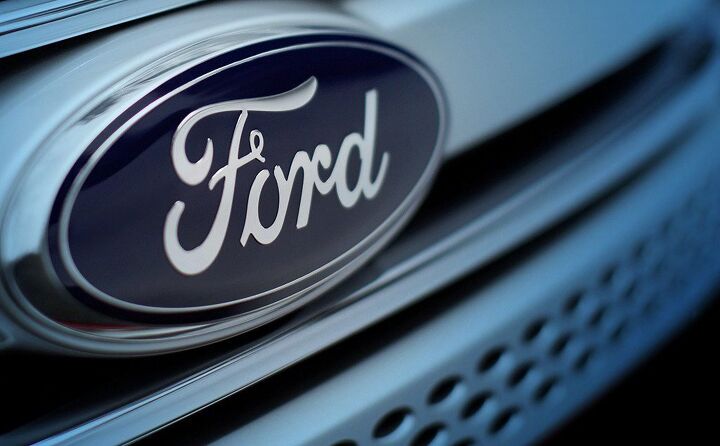Ford Briefly Closes Plants After Workers Test Positive for COVID-19

Ford Motor Co. temporarily shut down its Chicago Assembly Plant for a portion of Tuesday after two employees tested positive for the novel coronavirus. The facility had only been open for a single day, suggesting automakers may have to contend with infected employees on a regular basis. Responsible for Ford Explorer, Police Interceptor Utility, and Lincoln Aviator production, the site was idled briefly for disinfection before being reopened on Wednesday morning.
This return proved short-lived. The Chicago Tribune reports that Chicago Assembly closed again today, although COVID-19 was not to blame. Wednesday’s culprit happened to be those nasty supply chain issues we’ve been harping on. Ford’s Dearborn Truck Plant (home of the F-Series) did have a fresh coronavirus case, however. The facility was forced to match the Chicago factory’s response and shut down for sanitization measures on the same day — though at least Dearborn Truck seems to have a sufficient number of parts on hand.
Ford spokeswoman Kelli Felker explained that an unidentified supplier had left the automaker short on parts in Chicago, declining to name specific names. She did say that the matter would likely be resolved by Wednesday evening, with production resuming before Thursday morning.
From the Chicago Tribune:
At full capacity, the assembly plant runs with three shifts, seven days a week. Ford’s stamping plant in Chicago Heights also reopened Monday.
The Dearborn, Michigan-based automaker said it notified workers known to have been in close contact with the infected individuals at the Chicago Assembly Plant and asked them to self-quarantine for 14 days.
“It is important to note that due to incubation time, we know these employees did not contract COVID-19 while at work. Our protocols are in place to help stop the spread of the virus,” Felker said in a text.
Get comfortable with these kinds of incidents, as they’re likely to remain the status quo for a while. Despite the whole world trying to restore supply chains to a state approaching normalcy, they’re a total mess and will likely take weeks to get back in order. Meanwhile, automakers have implemented protocol at factory sites to help identify infected workers while making procedural changes designed to help protect staff.
Unfortunately, forcing facilities to shut down every time someone comes in with a fever may have wide-ranging consequences. Having been largely business-free for two months, domestic automakers are desperate to resume production and get some sales in before 2020 ends. And yet they’re going to pause every single time a new infection appears so that a factory can be sterilized.
Despite a weird amount of censorship surrounding the issue, we’ve gradually learned that coronavirus contagion rates are probably a lot higher than anyone realized, while the mortality rate is much lower than originally feared. Basically, everyone who was initially eager to prohibit “misinformation” ended up censoring valid information, while “authoritative sources” gradually changed their tune. This caused plenty of panic and confusion around policy at a time when facts were few, likely influencing the collective response.
The picture is somewhat clearer now, and COVID-19 is looking a little less scary for it. It’s still spreading, though, and there’s good reason to take steps to curtail that. Unfortunately, automakers are already well behind their production schedules and may be further hindered if they have to take a day off whenever someone shows signs of illness… not that there’s much of an alternative. The UAW has been adamant that protecting workers is its top priority, saying it won’t settle for automakers doing anything but the most they can to improve testing and reduce infections. Local governments have said much the same, with some states only agreeing to let production resume after manufacturers submitted health and safety plans.
For Ford, this has meant introducing routine temperature checks for employees, mandating face masks, providing face shields, as well as expanding the time between production shifts to limit interaction between employees. It also means reacting aggressively to any new outbreak, which is where we get our first bit of good news.
Ford said that, due to the incubation period of COVID-19, the infected employees couldn’t have gotten the virus at work. They also didn’t spend a lot of time on the assembly line, limiting the chance of spreading the virus to someone else. Those health checks will hopefully ensure that’s the case, though we’ll be watching to see how effective the new countermeasures prove to be in the coming months — both in terms of containing the pandemic and helping automakers stay on schedule.
[Image: Ford Motor Co.]

A staunch consumer advocate tracking industry trends and regulation. Before joining TTAC, Matt spent a decade working for marketing and research firms based in NYC. Clients included several of the world’s largest automakers, global tire brands, and aftermarket part suppliers. Dissatisfied with the corporate world and resentful of having to wear suits everyday, he pivoted to writing about cars. Since then, that man has become an ardent supporter of the right-to-repair movement, been interviewed on the auto industry by national radio broadcasts, driven more rental cars than anyone ever should, participated in amateur rallying events, and received the requisite minimum training as sanctioned by the SCCA. Handy with a wrench, Matt grew up surrounded by Detroit auto workers and managed to get a pizza delivery job before he was legally eligible. He later found himself driving box trucks through Manhattan, guaranteeing future sympathy for actual truckers. He continues to conduct research pertaining to the automotive sector as an independent contractor and has since moved back to his native Michigan, closer to where the cars are born. A contrarian, Matt claims to prefer understeer — stating that front and all-wheel drive vehicles cater best to his driving style.
More by Matt Posky
Latest Car Reviews
Read moreLatest Product Reviews
Read moreRecent Comments
- Namesakeone Yes, for two reasons: The idea of a robot making decisions based on algorithms does not seem to be in anyone's best interest, and the thought of trucking companies salivating over using a computer to replace the salary of a human driver means a lot more people in the unemployment lines.
- Bd2 Powertrain reliability of Boxer engines is always questionable. I'll never understand why Subaru held onto them for so long. Smartstream is a solid engine platform as is the Veracruz 3.8L V6.
- SPPPP I suppose I am afraid of autonomous cars in a certain sense. I prefer to drive myself when I go places. If I ride as a passenger in another driver's car, I can see if that person looks alert and fit for purpose. If that person seems likely to crash, I can intervene, and attempt to bring them back to attention. If there is no human driver, there will probably be no warning signs of an impending crash.But this is less significant than the over-arching fear of humans using autonomous driving as a tool to disempower and devalue other humans. As each generation "can't be trusted" with more and more things, we seem to be turning more passive and infantile. I fear that it will weaken our society and make it more prone to exploitation from within, and/or conquest from the outside.
- JMII Based on the human drivers I encounter everyday I'll happily take my chances with a computer at the wheel.The highway driver assist system on my Santa Cruz is great, it can self drive perfectly in about 90% of situations. However that other 10% requires you to be in control and make decisions. I feel this is the problem with an AI driving a car, there are times when due to road construction, weather conditions or other drivers when only a human will know what to do.
- Hari Your route home sounds like the perfect stretch for a car like the Alfa Romeo Giulia. Its renowned handling and dynamic performance make it an ideal match for those curves. For enthusiasts or potential owners interested in understanding all the capabilities of the Giulia 2017, the owner’s manual is an invaluable resource. Check it out here: https://chatwithmanuals.com/automobiles/2017-alfa-romeo-giulia-owners-manual/. Our AI-powered chat makes navigating the manual simple, helping you quickly find specific details about the car's features and specs. Perfect for making the most out of those driving moments and truly understanding your vehicle!


































Comments
Join the conversation
https://www.yahoo.com/news/coronavirus-scientist-quicker-exit-lockdown-072039855.html Oh how interesting. Yet another extremely smart individual saying the lockdown needs to end because infection rates are far higher than reported. Man it’s good to be right.
It's not clear to me why every company in the auto supply chain cannot test their employees prior to returning to work. I'm not talking every employee.... just the ones who cannot do their job remotely. If an employee is in a high risk group - diabetes, obesity, heart condition, etc. - the decision to return to work is a MUCH more difficult one to make.